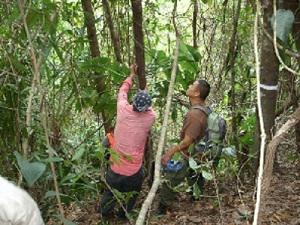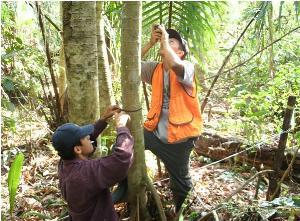Percival Cho
This project aims to engage indigenous communities to develop their capacity to assess forest carbon stock and increasing their knowledge, awareness and motivation to participate in national REDD planning.

Learning how to identify trees in a tropical forest.
Community understanding of forest conservation in poverty stricken southern Belize is limited by the need for tangible benefits through forest goods, leading to net negative conservation outcomes due to continued exploitation. This project will increase awareness about the contribution of forest conservation to CO2 emissions reduction among three indigenous communities. A forest-based approach will generate understanding about carbon dynamics and requisite forest measurements. Communities will gain increased understanding of forest conservation via REDD (Reducing Emissions from Deforestation and Forest Degradation) and of internationally accepted forest monitoring methodology. Indigenous communities will develop capacity to participate in national REDD planning thereby increasing potential opportunities for local forest biodiversity conservation.

One community member measuring the diameter of a Cecropia sp. tree while another measures the height. Note the plot marker post and transect tape to mark the edge of the quadrat.
This small project was conceived out of an identified need for the inclusion of all forested areas including community forests in the national REDD planning process currently being undertaken in Belize. This work builds on recent non-governmental and governmental efforts to introduce sustainable forest management to indigenous communities in southern Belize. Communities now have an improved understanding of the management of forest resources; however, intangible benefits of forest conservation, such as carbon sequestration, which can generate revenue, are still not fully understood. Knowledge and practices need to be implemented which will enable communities to gain optimal benefits from forest through conservation. Recent work with the target communities suggests that a field-based approach to understanding the carbon cycle and REDD will be both welcomed and timely. Of major importance is the development of capacity to carry out forest monitoring, which is a major criterion for REDD, and which is one of the main aims of this project.
This project will bring new skills and high impact conservation education opportunities to indigenous stakeholder communities buffering the Columbia River Forest Reserve protected area. This will contribute to increasing the level of appreciation for the conservation of forests in a region where deforestation and degradation is prevalent. This project will generate training opportunities for members of poor indigenous communities in the monitoring of tropical forests. This will contribute to a hands-on understanding of REDD as well as prepare communities to carry out the field data collection required for REDD project development. This project will train local team members in key forest mensuration skills in order to build sustainable and measurable local capacity to engage in long-term forest monitoring.